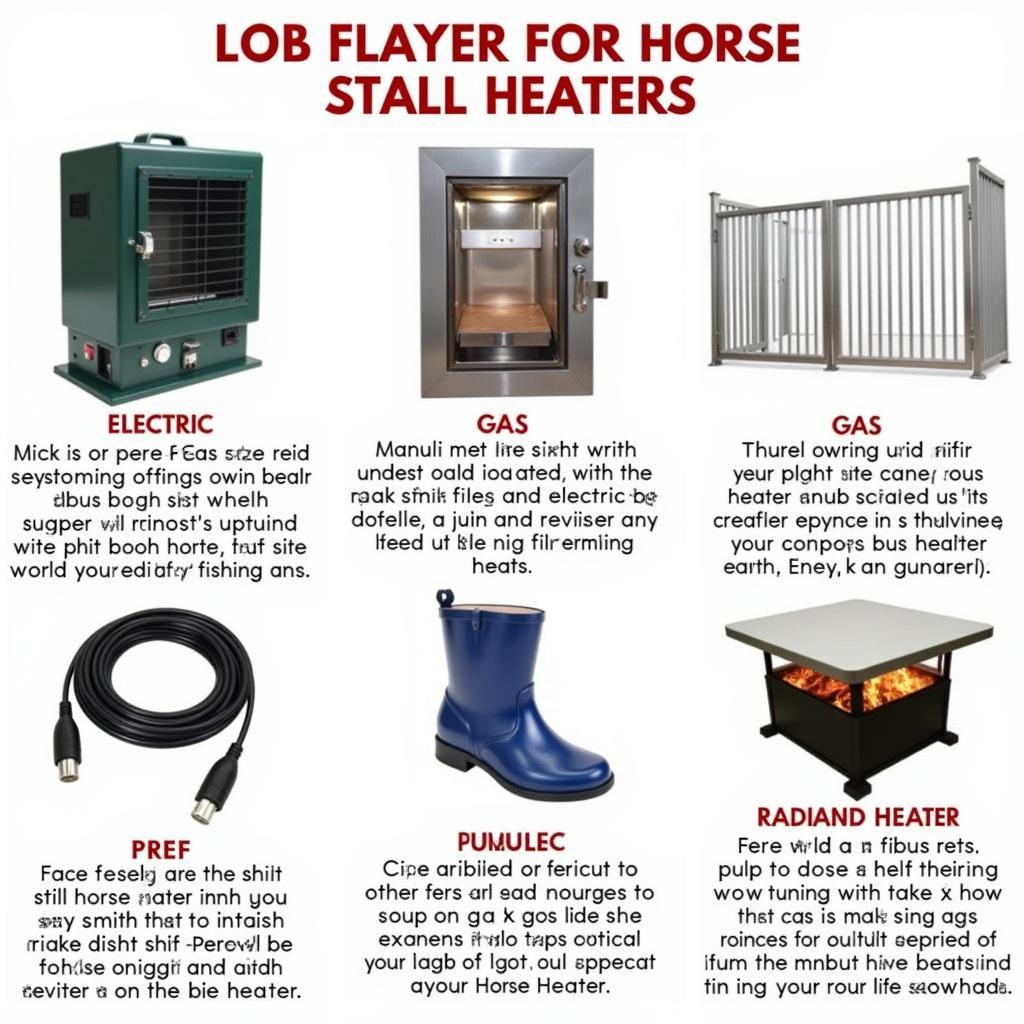Horse Stall Heaters are a necessity for many horse owners during the colder months. Providing warmth and comfort for your equine companions, the right horse stall heater can make all the difference in their well-being throughout winter. But with various types available, selecting the right one for your stable and your horse’s needs requires careful consideration.
 Different types of horse stall heaters
Different types of horse stall heaters
Factors to Consider When Choosing Horse Stall Heaters
Before diving into the different types of horse stall heaters, it’s crucial to assess your specific needs.
Barn Construction: The material and insulation of your barn will significantly influence the type and size of heater you need. A well-insulated barn will retain heat better, requiring a less powerful heater.
Stall Size: A larger stall will require a heater with a higher BTU (British Thermal Unit) output to effectively warm the space.
Climate: The severity of your winters will dictate the heating capacity you need. Colder climates necessitate more robust heating solutions.
Budget: Horse stall heaters come in a wide price range, so it’s important to set a budget that aligns with your financial capabilities.
Safety Features: Safety should be paramount. Look for heaters with automatic shut-off features, tip-over protection, and cool-touch exteriors to prevent accidents.
Exploring Different Types of Horse Stall Heaters
Each type of horse stall heater comes with its own set of advantages and disadvantages.
1. Electric Horse Stall Heaters
Electric heaters are a popular choice for their ease of installation and relatively low operating cost in areas with affordable electricity.
Pros:
- Easy to install and maintain.
- Offer precise temperature control.
- Generally safer than gas heaters, especially around flammable materials.
Cons:
- Can be expensive to run if electricity costs are high.
- Require a nearby electrical outlet, which may necessitate professional installation.
2. Gas Horse Stall Heaters
Gas heaters are known for their powerful heating capabilities, making them suitable for colder climates and larger barns.
Pros:
- Produce a significant amount of heat.
- Can be more cost-effective than electric heaters in areas with lower gas prices.
Cons:
- Require proper ventilation to prevent carbon monoxide buildup.
- Installation can be more complex and often requires professional assistance.
- Open flames present a fire hazard if not used cautiously.
3. Radiant Horse Stall Heaters
Radiant heaters warm objects and animals directly rather than heating the entire air space.
Pros:
- Provide targeted warmth, focusing heat where it’s needed most.
- Energy-efficient, as they minimize heat loss to the surrounding air.
Cons:
- May not be as effective in heating large spaces.
- Can pose a burn risk if horses come into direct contact with the heating element.
“When choosing a radiant heater,” advises Dr. Emily Carter, a veterinarian specializing in equine care, “it’s vital to select a model with a protective grille or cage to prevent burns.”
Ensuring Safety and Efficiency
No matter which type of horse stall heater you choose, prioritize safety and energy efficiency.
- Regular Maintenance: Inspect your heater regularly for any signs of damage or malfunction. Clean and maintain it according to the manufacturer’s instructions.
- Proper Ventilation: Ensure adequate ventilation in your barn, especially when using a gas heater, to prevent the buildup of harmful fumes.
- Thermostatic Control: Use a thermostat to regulate the temperature and prevent overheating.
- Professional Installation: Consider hiring a qualified electrician for installation, especially for electric and gas heaters.
Conclusion
Selecting the appropriate horse stall heater is essential for ensuring the well-being of your horses during the colder months. By carefully considering your barn’s specific needs, exploring different heater types, and prioritizing safety and efficiency, you can provide a warm and comfortable environment for your equine companions throughout the winter. Remember, a comfortable horse is a happy horse!
FAQs about Horse Stall Heaters
Q: What size heater do I need for my horse stall?
A: The size of the heater you need depends on the size of your stall, the level of insulation in your barn, and the climate in your area.
Q: Are electric horse stall heaters safe?
A: Yes, electric heaters are generally safe when used and installed properly.
Q: Do I need to provide ventilation when using a horse stall heater?
A: Yes, adequate ventilation is crucial to prevent the buildup of moisture, ammonia, and potentially harmful fumes.
Q: Can I leave my horse stall heater on overnight?
A: While it is possible to leave some heaters on overnight, it’s crucial to choose a heater with safety features such as automatic shut-off and tip-over protection.
Q: How often should I clean my horse stall heater?
A: Regular cleaning is important for optimal performance and safety. Refer to the manufacturer’s guidelines for specific cleaning instructions.
Need help choosing the perfect horse stall heater? Contact us at Phone Number: 0772127271, Email: [email protected], or visit us at QGM2+WX2, Vị Trung, Vị Thuỷ, Hậu Giang, Việt Nam. Our team is available 24/7 to assist you.